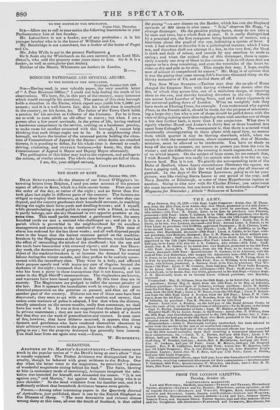GLEANINGS.
ANOTHER OF ST. MARTIN'S ACHIEVEMENTS.—There seems more truth in the popular notion of "the Devil's being at one's elbow" than is usually supposed. The Prefect Avitianus was distinguished for his cruelty, though he behaved with great mildness to the Bishop. One day when the latter went to the magistrate, he perceived "a demon of wonderful magnitude sitting behind his back." The Saint, blowing at him (a customary mode of exorcising), Avitianus imagined the salu- tation was intended for himself, and demanded the reason. "Isis not against you," said Martin," but against that hideous being who is at your shoulder." So the fiend withdrew from his familiar seat, and it is sufficiently evident that henceforth Avitianus became more gentle. Prarso.—Among other interesting papers in the Quarterly Journal of Agriculture, just published, there is one by the Ettrick Shepherd on the Diseases of Sheep. "The most destructive and ruinous disease among sheep at this time, all over the South of Scotland, is that called
the pining "—a new disease on the Border, which has cost the Shepherd upwards of 900 sheep in nine years. " It is," observes Mr. Hogg, "a .strange distemper. On the genuine pining farms, sheep do not take it by ones and twos, hut a whole flock at once. It is easily distinguished by a practised eye, the first symptoms being lassitude of motion, and a heaviness about the pupil of the eye, indicating a species of fever. I wish I had science to describe it in a pathological manner, which I have not, and therefore shall not attempt it ; but, at the very first, the blood is thick and dark of colour, and cannot by any exertion be made to spring ; and when the animal dies of this distemper, there is appar- ently scarcely one drop of blood in the carcass. It lives till there does not appear to be a drop remaining, and even the ventricles of the heart be- come as dry and pale as its skin. This simple fact may, I hope, enable men of science to comprehend its nature." Mr. Hogg is of opinion that it was the pining that came among Job's fourteen thousand sheep on the thirsty mountains of Uz, and carried them all off.
THE NEW 'WIDE STREETS.—Tacitus says that the people of Rome charged the Emperor Nero with having widened the streets after the fire, of which they accuse him, out of a malicious design, of exposing them to the sun, and thereby breeding disorders in the city. Nobody can accuse Lord Lowther of being Nero, and yet I object vigorously to the universal pulling down of London. What an unsightly hole they have made at Charing Cross, for example. I can understand why a great Place, as the French call it, should be made, for the purpose of ornament- ing a large city ; but why a row of shops should be pulled down with the view of doing nothing more than replacing them with another row of shops a few feet further back, is more than I can conjecture. What does it signify whether Howel and James's is thirty feet or three hundred feet apart from Colnaghi's. The consequence is, that there is a cursed wind continually circumgyrating in these places with equal fury, no matter from which quarter it may be blowing elsewhere, which, when we couple it with the second nuisance, above enumerated, that of Macada- mization, must be allowed to be intolerable. You have no shade to keep off the sun in summer, no screen to protect you from the rain in winter ; and the difficulties of the crossing is much augmented, a matter of no trivial import. On the subject of large areas, let me remark that,. I wish Russell Square was really (as certain wits wish it to be) an un- known land. But it is not. To gratify the acre-spreading taste of the Duke of Bedford, whose heavy countenance illustrates the square, we have a gaping void, in which the wind and the sun play all manner of gambols. In the days of Sir Thomas Lawrence, going to sit for your picture, was like visiting Sierra Leone at one period of the year, and Nova Zembla or Edinburgh, or some of these Hyperborean regions at. another. Going to dine now with Sir Charles Flower, you experience the same inconvenience, but you brave it with more fortitude.--Praser's Magazine for November ; Article "Nuisances of London."


























 Previous page
Previous page